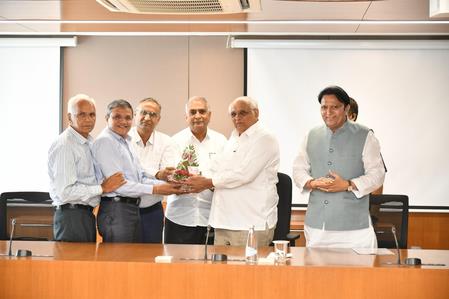Gujarat: Businessmen Meet CM Patel Thank Centre For GST Reforms (Lead)
The meeting, held in the presence of Industries Minister Balvantsinh Rajput, saw industry leaders welcoming the new framework as a“positive and inspiring step” for business growth.
The associations said the reforms would simplify day-to-day business operations, ease logistics, and create a more business-friendly environment. They also voiced confidence that the new GST structure would not only accelerate industrial development in Gujarat but also boost economic growth across the country.
In the financial year 2024-25, Gujarat recorded a GST collection of approximately Rs 1,36,748 crore, marking a robust increase of Rs 11,579 crore over the previous year and securing its position as the third-largest GST contributor among Indian states, accounting for 8.2 per cent of the country's domestic GST revenue.
This impressive growth was underpinned by a 13.6 per cent rise in SGST and IGST revenues, outperforming the national growth average of 10.31 per cent.
Monthly data further highlights this upward trajectory: April 2025 alone brought in Rs 14,970 crore, representing a 13 per cent year-on-year rise, while July 2025 GST collections for the state amounted to Rs 11,358 crore, up 3 per cent from July 2024.
The recently announced NextGen GST Reforms by the central government mark the most significant overhaul of the tax regime since its rollout in 2017. The reforms rationalise tax slabs by limiting them to two main rates -- 5 per cent and 18 per cent -- with a special 40 per cent slab reserved for luxury goods such as high-end cars, tobacco, and cigarettes.
GST on restaurant meals has been simplified to a flat 5 per cent, replacing the earlier system of multiple rates. Compliance has been eased with a single, unified monthly return, reduced filing frequency for small businesses, and an automated input tax credit to cut delays.
The reforms also introduce an AI-driven fraud detection system to check fake invoices and tax evasion, while a nationwide e-invoicing system will make transactions more transparent.
To support MSMEs, thresholds for GST registration have been raised, and a composition scheme has been expanded to include more small traders.
Additionally, GST refunds for exporters will now be processed within seven days, improving liquidity. Industry bodies have hailed these reforms as business-friendly, noting that they will reduce compliance burden, improve logistics efficiency, and boost growth, particularly for the manufacturing and services sectors across India.

Legal Disclaimer:
MENAFN provides the
information “as is” without warranty of any kind. We do not accept
any responsibility or liability for the accuracy, content, images,
videos, licenses, completeness, legality, or reliability of the information
contained in this article. If you have any complaints or copyright
issues related to this article, kindly contact the provider above.
Market Research

- Gas Engine Market Analysis: Strong Growth Projected At 3.9% CAGR Through 2033
- Daytrading Publishes New Study On The Dangers Of AI Tools Used By Traders
- Excellion Finance Launches MAX Yield: A Multi-Chain, Actively Managed Defi Strategy
- United States Lubricants Market Growth Opportunities & Share Dynamics 20252033
- ROVR Releases Open Dataset To Power The Future Of Spatial AI, Robotics, And Autonomous Systems
- Blackrock Becomes The Second-Largest Shareholder Of Freedom Holding Corp.



















Comments
No comment